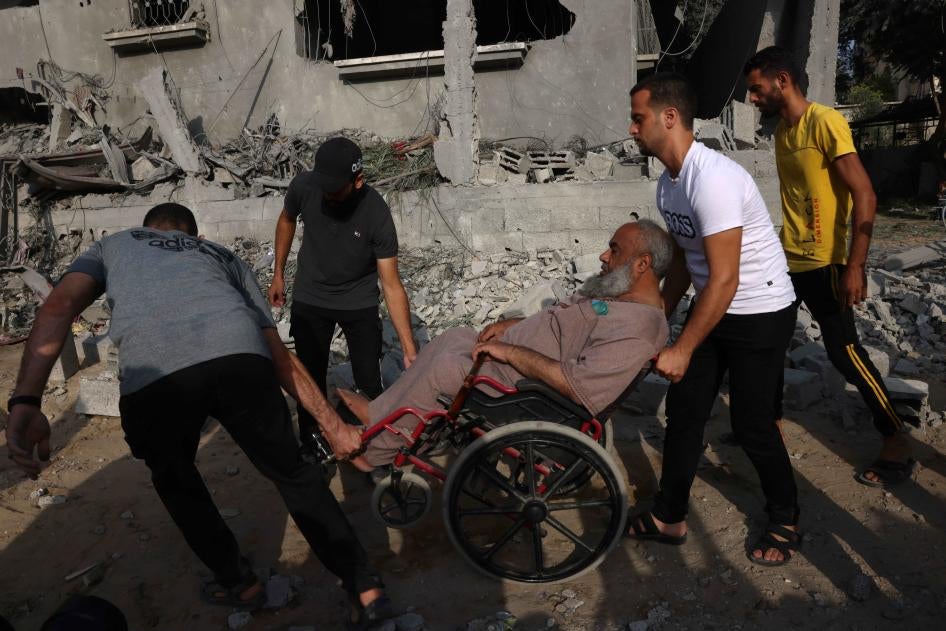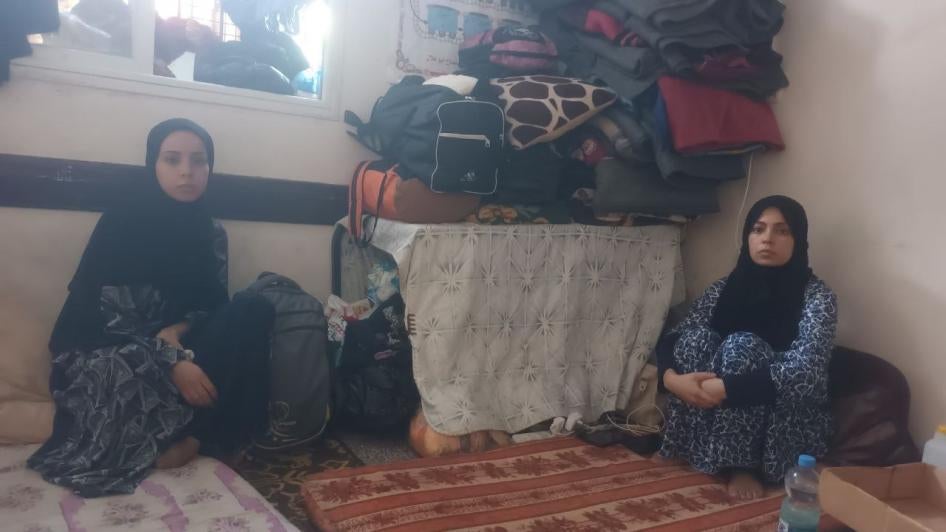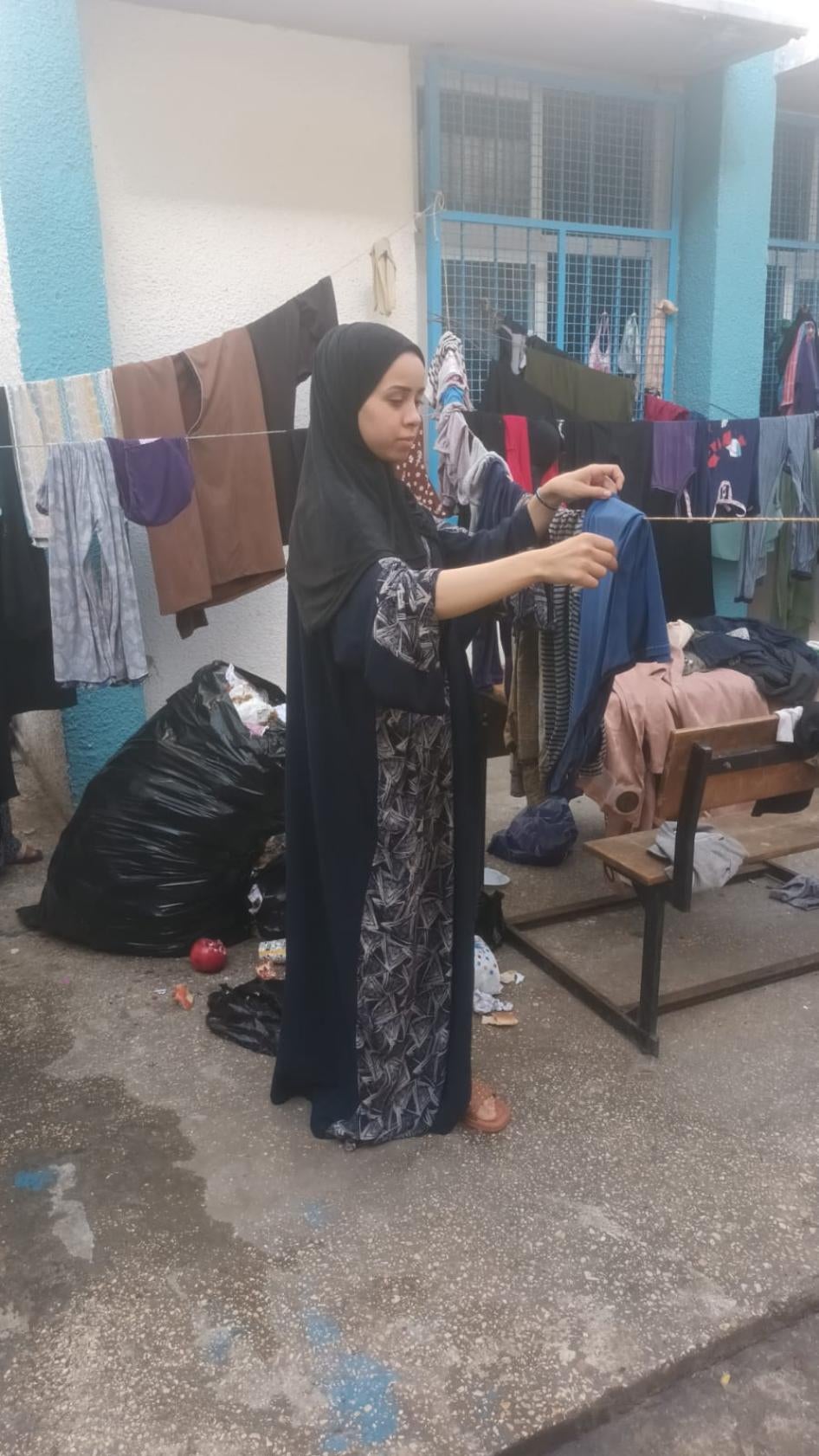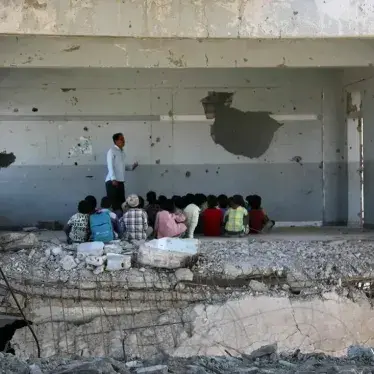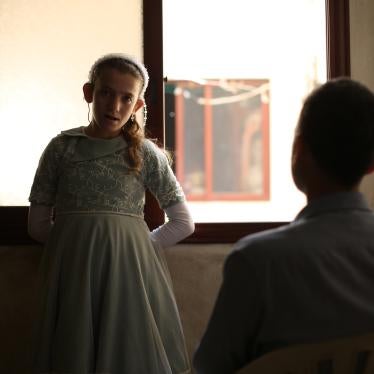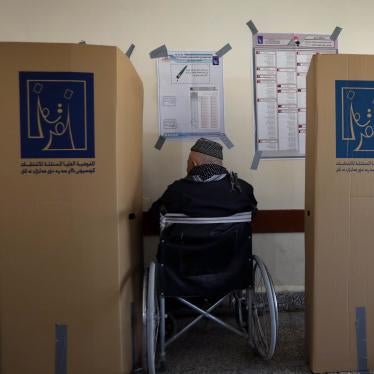(Jerusalem) – The Israeli government’s bombardment, blockade, and major ground offensive in Gaza is having a devastating toll on Palestinian civilians with disabilities, Human Rights Watch said today. They face greater difficulties fleeing attacks and accessing desperately needed necessities and humanitarian aid.
The grave risks all civilians in Gaza face from the Israeli military operations are multiplied for people with disabilities. Israel’s October 13, 2023, order to all civilians in the northern Gaza Strip to evacuate to the south did not take into account the needs of people with disabilities, many of whom are unable to leave. The order exposed them to the dangers of war and did not ensure that they would be provided with proper accommodation and satisfactory conditions.
“The Israeli military’s major ground offensive in Gaza adds immeasurably to the serious difficulties for people with disabilities to flee, find shelter, and obtain water, food, medicine, and assistive devices they desperately need,” said Emina Ćerimović, senior disability rights researcher at Human Rights Watch. “The United States and other Israeli allies should press Israel to take all necessary steps to protect people with disabilities and lift the blockade.”
Between October 18 and 29, Human Rights Watch interviewed by phone 13 people with disabilities in Gaza, including 10 who said they have been internally displaced, plus 2 family members of people with disabilities, and a psychologist.
Those able to evacuate described the dread of having to leave their homes, which had been designed to meet their accessibility and adaptability requirements, as well as their assistive devices, such as wheelchairs, walkers, and hearing aids. They also raised concerns about not having access to essential medication and the impact on their mental health. They and hundreds of thousands of others have been forced into overcrowded emergency shelters; mostly health facilities and schools, lacking sufficient access to water, food, and sanitation.
A general lack of assistive devices in Gaza such as wheelchairs, prostheses, crutches, and hearing aids, a result primarily of restrictions linked to Israel’s unlawful 16-year closure of Gaza, is also effecting people’s ability to flee. People who have visual, hearing, developmental, or intellectual disabilities may not hear, know about, or understand what is happening.
Several people with disabilities said that lack of electricity and internet disruptions, have made it more difficult for them to access crucial information that would have helped them to decide where, when, and how to flee for greater safety.
The Israeli forces’ current bombardment and ground offensive in Gaza began following the October 7 Hamas-led attack in Israel that resulted, according to Israeli authorities, in the killing of about 1,400 people, hundreds of them civilians. Hamas and Islamic Jihad took hostage more than 230 people, including children, people with disabilities, and older people.
Israel’s cutting of electricity and water to Gaza, and blocking the entry of fuel, food, and all but a trickle of humanitarian aid, including medicines, amounts to collective punishment, a war crime. The Palestinian Health Ministry in Gaza reported that since the Israeli bombardment of Gaza began on October 7, at least 8,500 people had been killed as of October 31, including more than 3,500 children. The United Nations Office for the Coordination of Humanitarian Affairs (OCHA) estimates that over 1.4 million have been displaced.
People with disabilities who said they were displaced by the hostilities described the difficulties they faced fleeing attacks, especially in the absence of advance warnings, as well as the heavy destruction they have to navigate, and their fears about fighting.
Samih Al Masri, a 50-year-old man who said he lost both legs in an Israeli drone strike in 2008, said he was sheltering at al-Quds hospital in Gaza City, but does not feel safe anywhere: “If they bomb the hospital, I will be dead. I know I cannot move.”
Several people with disabilities said that they lost assistive devices when Israeli strikes destroyed or damaged their homes, leaving them homeless and unable to get necessities. All said that the Israeli military did not provide advance warning of the attacks. According to the Palestinian Housing Ministry in Gaza, at least 45 percent of homes in Gaza have been destroyed or damaged during the hostilities.
Both international humanitarian law and international human rights law protect the rights of people with disabilities in armed conflict. The UN Convention on the Rights of Persons with Disabilities (CRPD), ratified by Israel in 2012, states that member states, in accordance with their obligations under international humanitarian law, need to take “all necessary measures to ensure the protection and safety of persons with disabilities in situations of risk, including situations of armed conflict.”
UN Security Council Resolution 2475 urges all parties to armed conflict to take measures to protect civilians with disabilities; allow and facilitate safe, timely, and unimpeded humanitarian access to all people in need of assistance; and support providing sustainable, timely, appropriate, inclusive, and accessible assistance to civilians with disabilities, among other responsibilities.
Under international humanitarian law, warring parties must take all feasible precautions to minimize harm to civilians, including by providing effective advance warning of attacks unless circumstances do not permit. The Office of the UN High Commissioner for Human Rights (OHCHR) noted in 2015 that “the failure to comply with this obligation in an accessible and inclusive manner amounts to discrimination on the basis of disability.”
Eighty-three countries, including the United States, have signed a commitment to refrain from using explosive weapons with wide-area effects – including heavy artillery and aerial bombs – in densely populated areas because of how likely they are to kill and injure civilians indiscriminately. Israel’s continual bombardments of Gaza, which have reduced city blocks and large parts of neighborhoods to rubble, magnify this concern many times over.
The dire situation is exacerbated by the Israeli government’s unlawful 16-year closure of Gaza, which is part of the crimes against humanity of apartheid and persecution being committed by Israeli authorities against Palestinians. Human Rights Watch has previously reported on human rights violations against people with disabilities in Gaza due to the Israeli government’s prolonged closure, as well as neglect by the Hamas authorities.
The United States, United Kingdom, European Union, and other Israeli allies and governments in the region such as the United Arab Emirates, Egypt, and Bahrain, should press Israel to restore the flow of electricity and water, and allow in fuel and humanitarian aid, including so that medication, assistive devices, and psychosocial support can reach people with disabilities.
They should also condemn violations of international humanitarian law by all parties, including any indiscriminate attacks; highlight the need for accountability, including at the International Criminal Court; and end all forms of complicity in grave abuses, including military assistance. UN Security Council members should urgently press Israel to protect people with disabilities in Gaza in line with Security Council Resolution 2475 and the CRPD.
“Israel’s disregard for civilians in Gaza hits people with disabilities especially hard,” Ćerimović said. “UN member states should urgently act to ensure Israel and other warring parties in Gaza comply with the legal obligations to prevent further atrocities and suffering, including for people with disabilities.”
For accounts of difficulties faced by people with disabilities during the current situation in Gaza, please see below.
Pseudonyms have been used for some people interviewed for their protection.
Difficulty Fleeing Attacks
People with disabilities in Gaza described difficulties in fleeing attacks, especially in the absence of effective warnings, as well as the heavy destruction, which made it extremely difficult to escape using their wheelchairs and other assistive devices. The lack of electricity has meant that elevators have not been functioning, making it effectively impossible for people with certain physical disabilities who live in high-rise buildings to leave their homes.
Samih Al Masri, the man who said he lost both legs in an Israeli drone strike in 2008, said he was at home with his son, 17, daughter, 26, and granddaughters, 3 and 5, when an Israeli strike hit his house in the Tel-Hawa residential neighborhood south of Gaza City on October 17:
My son was in a state of shock, he was screaming. My daughter didn’t know who to help first, me or her kids. She was yelling at her brother, “Help your dad!” A neighbor heard her screams and came and helped me get out of the house, which wasn’t easy—there was rubble everywhere.
He said the Israeli military gave no advance warning of the attack.
Jamal Al Rozzi, the father of a 27-year-old man with cerebral palsy, described the difficulties he faced helping his son get out of their home when their residential neighborhood in Rimal, Gaza City, came under heavy Israeli bombardment on October 10:
Usually, my son can walk with the help of a crutch, but when the bombardment started, he froze. He became like a stone, he put fingers in his ears, and he started to scream. I just asked him to stand on his feet to help me move him, but he couldn’t. I had to put him down on the floor and drag him to the other side of the apartment, to another corner that might be safer.
Al Rozzi said the Israeli military gave no advance warning of the attack.
Following the attack, and due to the lack of electricity to operate elevators, Al Rozzi relocated with his family to a relative's ground-floor home from the third floor of their building. Al Rozzi said he still had deep concerns about their safety:
Moving is very risky. Staying at home is risky. We never know when this bombing will happen, which side to go, where to hide. There are no places to hide.
And if I feel like this, imagine what it is like for older people or people with disabilities? The kind of high-rise buildings in Gaza with no functioning elevators at the moment—how will people escape?
Abu Shaker, a 49-year-old man with a physical disability who lived in the Zeitoun residential neighborhood of Gaza City, said what he believed to be an Israeli strike hit a building next to his house on October 10, killing 19 people. Just before the attack, two of his children, ages 8 and 26, were buying food in a nearby supermarket. Abu Shaker said that his disability made it harder for him to come to the aid of his children:
When we got bombed, I started crying. Everyone around me was running, and I just stood there, and I felt my disability. Two of my kids were missing, I didn’t know what I should do, how to look for my kids.… I stopped my neighbors in the middle of the street, people I didn’t know, everyone was screaming, and I kept asking them, “Where is Shaker [his son]?” I was so confused. I just stood there for an hour screaming my children’s names because someone told me they could be under the rubble. After an hour and a half, I received a message that they were injured and in a hospital.
Abu Shaker said that the Israeli military gave no advance warning of the attack.
Even in previous hostilities, when Israeli forces provided advance warning of an attack, those warnings are not always effective, particularly for people with disabilities.
Lateefa Al Jabari, a 40-year-old woman with a disability, said that the Israeli military’s warnings have not been effective for many people with disabilities. “Some houses will receive a call and they give you three to five minutes to evacuate,” she said. “For many people with disabilities, that’s not enough for them—they need two people to help them.”
Some people described the fear they felt knowing they would not be able to safely flee if their home came under attack.
Eman, a 33-year-old sister of Afaf, a 24-year-old woman with cerebral palsy, said she fears having to flee airstrikes, especially because of her sister. She said that, during hostilities in 2019, she had to carry her sister and take cover under the stairs in their building, unable to proceed further. “We wouldn’t be able to flee this time around.… My sister’s old wheelchair doesn’t fit her, and she is too heavy for me to carry her. I wouldn’t even know where to go.”
Eman said that, even if her sister had a suitable wheelchair, their escape would remain daunting due to the extensive destruction in their vicinity, and the overall lack of accessibility.
In 2020, Human Rights Watch documented the effects of inaccessible infrastructure across Gaza on the ability of people with disabilities to enjoy their human rights on an equal basis with others. The current destruction has exacerbated the already dire situation, Human Rights Watch said.
It is difficult for many people in Gaza to evacuate to safer places. On October 15, The US broadcast station NBC reported that an orphanage in northern Gaza – where 22 children live, including 12 with disabilities – was unable to evacuate due to the high-support needs of some of the children.
Saad G. (pseudonym), a 33-year-old man with a physical disability who uses a wheelchair and lives in an apartment in central Gaza, said that he is afraid that he will have to flee. “This neighborhood is not equipped for people with disabilities,” he said. “If it was bombed, or the fighting came here, I wouldn’t be able to flee to any destination.”
Bader Mosleh, a 39-year-old disability rights activist who has a visual disability and father of three children ages 2, 8, and 10, is hosting 5 families who have fled from the north at his home in central Gaza. “I feel I cannot protect my family or the people I am hosting because of my disability,” he said. “What will I do if I need to act fast? I also wouldn’t know where to go. There is no safe place.”
Mosleh explained why he decided not to flee after Israeli airstrikes hit his area:
I cannot see, I am used to my house, and I’m afraid of going to a place where I don’t know anything, where I don’t know to find my way around.… But, also where to go? All schools around me have too many people … They have a lot of problems, especially when it comes to water and toilets.
Mosleh and Feadaa Omar, a psychologist and sign language interpreter, described the difficulties people with hearing disabilities have faced during strikes. “Even before the war, there was a huge problem with access to hearing aids and batteries,” Mosleh said. “Now, this is even further endangering lives of people who rely on hearing aids to be able to hear what’s happening around them so they can protect themselves.”
Iman, a 19-year-old woman with a hearing disability said she sought shelter at the Khan Yunis Primary School for Girls in the southern Gaza Strip after her neighborhood in al-Fukhkhari in southern Gaza Strip came under attack. She said the lack of access to assistive devices affects her safety: “I don’t have a hearing device, so I don’t know when they are bombing! I can feel the vibration under my feet and I see people running without knowing what is happening!”
Several people with disabilities said that lack of electricity and internet disruptions caused by damage to infrastructure; lack of electricity, and apparent Israeli cuts, have made it more difficult for them to access crucial information that would have helped them to decide where, when, and how to flee for greater safety.
Internet and phone shutdowns can cause considerable harm to the civilian population, including leading to possible injury and death by preventing civilians from communicating with each other about safety considerations, access to medical facilities, and sources of food and shelter. Importantly, the restrictions hamper the ability of humanitarian agencies to assess and provide assistance to populations at risk. The lack of information regarding the conditions and circumstances facing the affected population may also increase the likelihood of injury and death.
Impact of Order to ‘Evacuate’
Over 1.4 million Palestinians in Gaza have left their homes since hostilities began on October 7, the UN estimates. Israel’s order on October 13 to all civilians in the northern Gaza Strip to evacuate risks forced displacement, a violation of international humanitarian law and a war crime. Forced displacement disproportionately affects people with disabilities. While warring parties are encouraged to issue effective warnings to help civilians protect themselves, ordering a million people to evacuate when there is no safe place to go and no safe way to get there is not an effective warning. For people with disabilities, being forced to leave one’s home is particularly harrowing and not everyone can comply with Israel’s evacuation order.
People with disabilities in northern Gaza said they felt forced to leave their homes or temporary accommodation without any regard for their disability.
Zahra Al Madhoun, a 39-year-old woman with a physical disability, initially decided to stay behind when her family fled.
“They didn’t give us a safe place to go to,” Al Madhoun said. However, she fled a few days later after she said she received a call from someone purporting to be Israeli intelligence warning her to go south. “My home was my safe place. I only left because of the call. I was afraid I would be the only one to stay behind.”
Al Madhoun is currently living in a displaced persons’ camp in dire conditions and said she was considering returning home.
Abu Shaker is sheltering at a UN Relief and Works Agency (UNRWA) school in the Zeituni neighborhood of Gaza City. He said he was unable to move to the south with his 43-year-old wife, who has a chronic health condition, his seven children, including two injured from airstrikes, and his parents in their 70s: “Israel is bombarding the area where we are constantly, hitting around the schools to scare us and at the same time ordering ‘whoever is in the north, must go south,’ but where? How? Are the roads even safe?”
People with disabilities who live in the central Gaza Strip said they fear Israel’s government will issue a similar order demanding that they move south as well. Saad, 33, who uses a wheelchair, said his biggest fear is being forced to have to evacuate his home in central Gaza Strip:
There is no safe place for me [as a person with a disability]. Having to leave my house is my biggest fear.… The neighborhood where I live is not equipped for people with disabilities, nor are the places where my friends [with disabilities] have been forced to go to.
Saad said that airstrikes destroyed the homes of several of his friends with a disability and some lost their assistive devices. One friend with paralysis has moved four times. “Last time we spoke, the place where he was sheltering was bombed, and he spent all night on the street,” Abdelkareem said. “Every time he has to move, someone needs to carry him.”
Shortage of Medication
Israel’s blocking of humanitarian aid to Gaza has created serious shortages of medical equipment, supplies, and medication. The military bombardment of Gaza has also made it more difficult for people to access their medication and medical equipment. On October 25, UNRWA reported that its stocks of medicines were “critically decreasing.”
Dr. Mustafa, a man with a physical disability, fled his home in north Gaza after Israel’s October 13 evacuation order. He was sheltering at al-Hilal hospital in Khan Yunis with his six children, including two who have disabilities, and his 75-year-old mother, who has paralysis. He said he is running low on medication for hypertension and diabetes for both himself and his mother. Dr. Mustafa’s mother needs a wheelchair but doesn’t have access to one.
Samih Al Masri said he has been on medication since he lost his legs and had only one day supply of the medication Neurontin, an anti-convulsant and anti-epileptic drug for his nerve damage and pain relief when he fled. Stopping Neurontin suddenly can lead to tremors, rapid heart rate, and high blood pressure, among other symptoms.
When our home came under bombardment last night and I had to flee, I only had two pills on me. Tomorrow, I will run out and I don’t know how I will get more medication. If I don’t take the medication, I can’t breathe and will start experiencing heart palpitations.
Saad G. said he ran out of baclofen – medication used to treat muscle spasticity – and the Neurontin he usually takes three times a day.
He said that he does not feel safe going to the Health Ministry in Gaza City, where he usually receives his medication, because it is a government building in the evacuation zone. He described the effects of not taking his medication: “It has worsened my muscles and nerves. My muscles are twitching, and I am unable to stop my body from reacting. This could also give me high blood pressure and I could get really sick with high fever.”
Al Madhoun, the 39-year-old woman with a disability who is sheltering at a displaced persons’ camp, said she hasn’t been able to take her hypertension and diabetes medication since the start of the hostilities: “Usually, I get the medication from UNRWA, but there is no organization on the ground right now giving out medication.”
Overcrowding in Shelters
OCHA reported that overcrowding in 150 UNRWA-designed emergency shelters is a growing concern, where the average number of displaced people per shelter has reached more than 2.5 times their designated capacity. OCHA said that shelters are not equipped to meet the needs of displaced people with disabilities, which they estimate constitute more than 15 percent of the displaced population.
The Palestinian Health Ministry has reported growing cases of epidemic diseases, while Médecins Sans Frontières has warned that cramped and poor hygienic conditions in makeshift shelters coupled with a lack of access to clean water is heightening the risk of waterborne diseases.
People with disabilities who have become displaced in hospitals, schools, and makeshift camps, said that they are suffering from severe overcrowding, appalling conditions, and lack of access and inaccessibility to basic services. Al Masri, who was sheltering in a hospital, said: “I only have one meter of space. I cannot move, and there aren’t enough toilets for all the people to have a turn.”
Abu Shaker said there were 4,000 people in the school he is sheltering at: “Every corner of the school is full, when you turn right, there is someone there, to the left, same. Most people are trying to fit their body on the floor. They have nothing to cover themselves with either, and there is no privacy.”
Iman, the 19-year-old woman with a hearing disability, said that lack of access to a hearing device contributes to the anxiety and fear: “I feel alone, isolated from all the people; … I can’t get in touch with anyone, there is no electricity in the schools, no internet, and no phones. I left my house without anything.”
Iman’s sister, Abir, who is 30 and also has a hearing disability, said that she feels suffocated due to the overcrowding in the shelter: “This experience is painful, I can’t think or pay attention, I can’t breathe. I only feel at ease in my own house and that is it.”
Lack of Access to Water
Israel, as part of its total blockade, on October 11 cut off all water supplies to Gaza. People with disabilities said they had limited access to clean drinking water, with several saying they had no choice but to use groundwater. OCHA has previously reported that the groundwater in Gaza was almost entirely “unfit for human consumption.”
Abu Shaker said it is harder for people with disabilities like himself to secure clean drinking water. He said he often has no choice but to drink the municipal water, which is usually only used for toilets.
However, even the groundwater can be inaccessible due to a lack of electricity to pump it.
Mosleh, who has a visual disability and had been hosting 40 displaced people in addition to his family of five in his home, said he needed to walk three kilometers every day to fetch water: “Since I cannot see, I take my daughter with me. We walk three kilometers to get to the water distribution place.… The water they are giving us is not enough for 40 people.”
Al Madhoun, the 39-year-old woman living in a camp, said: “I don’t have people here whom I know, I cannot access water or food and I don’t feel safe.”
Lack of Access to Food
Eighty percent of Gaza’s total population before October 7 relied on humanitarian aid, and many found it hard to get adequate food. On October 21, the UN World Food Programme called conditions inside Gaza “catastrophic,” with food “desperately needed.”
People with disabilities interviewed, all reported difficulties in meeting their basic food needs, and said that their disability was affecting their ability to secure food for themselves and their families.
Before October 7, Abu Shaker and his family used to rely on food assistance from UNRWA. He said he now goes to great lengths to buy food: “Usually, for people with disabilities, one of their family members goes and gets what’s needed. But, since I am the father and don’t want to put anyone in my family in danger, I go myself – despite my disability – to get all the necessities.”
Abu Shaker said that getting food was becoming harder every day: “Bakeries have been bombed or have run out of flour. We are 11 people in my family, and I was allowed today to buy only 25 pieces of pita bread, which is not enough. I am also running out of money.”
Mosleh said that there was no food for children or adults with disabilities who require a special diet. OCHA reported that the food distributed following the arrival of the trucks carrying aid did not meet the needs of those with dysphagia, swallowing difficulties that can affect people with a wide range of disabilities and medical conditions.
Access to Sanitation/Toilets
People with disabilities who have been displaced all said they were unable to access toilets in schools, hospitals, and other shelters. Al Masri said, “the hospital where we are staying is not meant for people with disabilities; the toilet is not made for people who use a wheelchair. It’s a very difficult situation for me to use the toilet.”
Mosleh said that most toilets in hospitals and UNRWA schools are squat toilets, which are completely inaccessible to many people with physical disabilities.
Dr. Mustafa said it was especially hard on his 75-year-old mother, who cannot use the inaccessible toilet in the hospital where she is sheltering. He said that he also cannot access incontinence underwear for his mother and that the hospital has also run out of toilet paper. “Ensuring hygiene is very difficult,” he said. “I’ve not been able to take a shower since the war started. Nor my mother. No one in my family has.”
Al Madhoun said that accessing a toilet is her biggest problem, especially since she doesn’t have a wheelchair or a walker: “I am crawling on the floor to get to the toilet.”
All said they could not get basic hygiene items, such as toilet paper or soap, and that they fear an outbreak of diseases.
Mental Health Impact
In September 2022, OCHA reported that one-third of Gaza’s population is in need of psychosocial services due to increased psychological distress and mental health conditions. Human Rights Watch reported in December 2020 that people with disabilities experienced psychological distress as a result of Israel’s closure and traumatic experiences, including an inability to flee and fears of a future attack.
The current bombardment and siege has worsened the mental health impacts on civilians in Gaza, including traumatizing children.
Abu Shaker said his 8-year-old daughter was no longer herself after an airstrike injured her: “Every time we hear a missile or a bomb, my youngest child tries to cover her ears to keep from hearing. She has an emotional reaction. As adults, we are so confused, we don’t know how to deal with everything that’s happening.”
Health experts described the mental health impact of the bombardments and siege on people with disabilities. Feadaa Omar, the psychologist, works in the Khan Yunis Primary School for Girls in the southern Gaza Strip school where 3,000 families, including many people with disabilities, have been sheltering:
What I am seeing is lots of fear. Lots of sadness and disappointment. We are dying every day and nothing is changing. When I am at school, I see lots of people crying. Some children and adults have stopped talking, you cannot get any reaction from them. And then there are huge reactions to any kind of sound, especially with the kids, they try to cover their ears to not hear the bombing. If an adult or a child has a disability, it’s even harder for them. Especially people who cannot hear.
Omar said that many people with hearing disabilities fled their homes without their hearing devices and cannot communicate with the thousands of other people sheltering at the overcrowded, unfamiliar school. Nisrine, a 40-year-old woman with a hearing disability, who is sheltering in the school where Omar is working, said: “My house is bombed, so many kids have been killed, my family is homeless, my friends I don’t know anything about them, and my hearing device is not with me. I can’t communicate and I don’t even know what to talk about.”
In addition, Omar said, “People with physical disabilities also had to flee without their wheelchairs or walkers, and the school “was not built for wheelchair users.… This causes many different emotions on how to go about their daily situation.”
She described measures she was taking to provide people with some support:
While having my own feelings, I try my best to support people there. For example, I take my MP3 player with me, and I play some music to change whatever they are feeling, just to stop them thinking about the war. I am also trying to organize drawing sessions, hoping that it will help the mood. Writing and telling stories [too].
